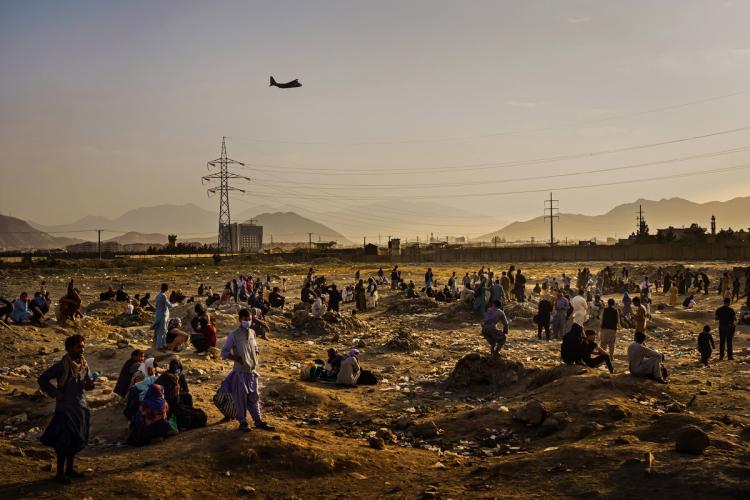
Four OHIO alumni win Pulitzer Prizes for journalism

Four Ohio University alumni won Pulitzer Prizes for their coverage of major news, including three for their efforts to cover the Jan. 6, 2021, riots at the U.S. Capitol building.
Matt Zapotosky, BSJ ’08, is a former editor of the Post at Ohio University who now covers the U.S. Department of Justice for the Washington Post. He was part of the team that won the Pulitzer for “comprehensive coverage of the January 6 insurrection.” Zapotosky and colleague Devlin Barrett wrote a story detailing that an FBI office in Virginia warned that “extremists were preparing to travel to Washington to commit violence and ‘war,” a warning that came the day before the riots.
“Our contribution to that package was basically just doing our jobs, scrutinizing the FBI,” Zapotosky said. “It’s really nice. We don’t do the work to win a prize, but it’s nice to have people recognize you for just doing the work.”
Another alumnus, Amanda Voisard, BSVC ’02, took photos inside the Capitol during the riots for the Post and was included in the award. And another photographer, Drew Angerer, BSVC ’12, and a team of colleagues from Getty Images won in the Breaking News Photography category for “comprehensive and consistently riveting photos of the attack on the U.S. Capitol.”
Marcus Yam of the Los Angeles Times won a Breaking News Photography Pulitzer for his “raw and urgent images of the U.S. departure from Afghanistan that capture the human cost of the historic change in the country.” Yam, a non-degree alumnus of the Scripps College of Communication, has been part of two previous Pulitzer-winning teams.
Yam traveled to Afghanistan just before America’s withdrawal from the country and stayed for two months, the Los Angeles Times reported. His report documented the departure of American troops, the rise of the Taliban, and the suffering caused in the country.
“In August 2021, I arrived in a fear-gripped Kabul. The Taliban was approaching the Afghan capital quickly. I decided to remain behind, even as other western publications were pulling out their journalist, in order to do the work I believed in: My lens was focused on Kabul residents’ fear, loss and betrayal,” Yam said via email after the win. “Documenting the fall of Afghanistan was one of the most challenging stories I’ve covered in my career. Navigating instability, trauma, sensitivity, violence and security all at the same time was difficult. The loss suffered by the Afghans is insurmountable and encapsulating that same loss in a series of photographs for our readers was equally as tough.”
Scripps College of Communication alumni, especially in the School of Visual Communication and the E.W. Scripps School of Journalism, have a long history of winning journalism awards at the highest level. Since 1976, 84 alumni, students and faculty have won or contributed to teams that won at least 55 Pulitzer Prizes.
“I am inspired to see our alumni recognized for their brave and important work of documenting the world’s stories,” said Dean Scott Titsworth. “All of our alumni do amazing work, but seeing these individuals rise to this level of recognition is certainly exciting for all of us in the OHIO Scripps community.”
Zapotosky said the skills he learned at OHIO put him on the right course.
“In a lot of ways, I really learned how to be a journalist at the Post at OU. That’s where I learned how to report, how to knock on people’s doors, how to hold university folks and city folks to account,” he said, adding that he’s gotten to know or work with other alumni who have won Pulitzers. “OU is just instrumental in shaping me as a journalist.”
Yam, too, said he learned how to knock on doors and gain the trust of strangers while studying at OHIO.
“I learned how to knock on doors, introduce myself to strangers, walk into fascinating worlds; from a tight-knit community of Shade, Ohio, to the Amish who maintained a phone booth inside a refrigerator placed in the middle of the woods,” Yam said. “I did not have a photography background before I started this career. I enrolled because I wanted and needed to accelerate my learning and understand of the craft. VISCOM and its faculty were crucial to my growth as a photojournalist.”
While the Pulitzer recognition is gratifying, Zapotosky said he didn’t get into the business for accolades.
“We go into this business not because we’re looking to get the most clicks on a story or get the most conversions by making subscribers out of people,” he said. “We go into it because we think there’s a higher mission here.”
Yam agreed.
“It’s an incredible honor to have your work recognized by the Pulitzer awards, it helps bring honor and recognition to the institutions that supported you, and a critical spotlight on the historic change in Afghanistan, and what it means for Afghans. More important now seeing as how quickly the news cycle moves on,” he said. “After the Pulitzer announcements, I woke up the next day feeling the same way I did after the first two Pulitzers: I collected my gratitude, thanked everyone who had a hand in my career, and I desperately wanted to get back to work, back on the road.”
